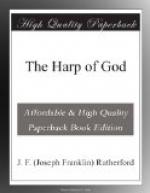[84]It is true that all who have died from Adam until now have gone to hell. But hell does not mean a place of conscious torture. Wherever the word hell occurs in the Bible it means the condition of death. Hell is not a place, but a condition. Those who go into the grave are not conscious there; but they have gone into the death condition. Their bodies decay and return to the dust. The word hell is translated from the Hebrew word sheol, as used in the Old Testament. This same word is a number of times translated grave and sometimes pit. In the New Testament the same word hell is translated from the Greek word hades and likewise means grave, the condition of death, the tomb.
[85]Some Scriptural illustrations of this prove that hell means a condition of death. Job was a good and godly man, who tried to obey Jehovah. He had suffered the loss of all his earthly possessions and then his neighbors taunted him because of his suffering; and while he was thus suffering, he prayed that God would permit him to go to hell, saying: “O that thou wouldest hide me in hell [sheol, the grave] until thy wrath be past”. (Job 14:13) He desired to be hid in the grave until the time of the resurrection, hoping in God’s promise that some day the dead would come again. Then Job says: “If I wait the grave is mine house: I have made my bed in the darkness”. “Our rest together is in the dust.” (Job 17:13,16) Thus he pictures the grave as a condition of darkness, where there is no knowledge, no wisdom or device. Again he said: “A man’s sons come to honor, and he knoweth it not; and they are brought low, but he perceiveth it not of them”. (Job 14:21) Why? Because those who are in hell, in the tomb, in the grave, in the condition of death, have no knowledge of anything. They are out of existence, waiting for the resurrection.
[86]Jacob’s beloved son Joseph was sold into Egypt by his brethren. Joseph’s coat was dipped in the blood of an animal and brought to Jacob, and it was told Jacob the father that his son Joseph was dead. In his grief he exclaimed: “I will go down into hell [sheol, the grave] unto my son mourning”. (Genesis 37:35) Jacob was a good man and approved of the Lord; for the Apostle says he was. (Hebrews 11:9,39) Jacob meant that he was going to the grave, to the death condition, mourning for his beloved son.
[87]Benjamin was Jacob’s youngest son. After he lost Joseph his affections were centered upon Benjamin. His elder sons came to him and requested that their younger brother be permitted to go down with them to Egypt. Their father Jacob objected to their taking him, saying, “My son shall not go down with you; for his brother is dead, and he is left alone: if mischief befall him by the way in which ye go, then shall ye bring down my gray hairs with sorrow to hell [sheol, the grave]”. (Genesis 42:38) We know, then, that the hell here described could not be a place of fire and brimstone, for the gray hairs of Jacob would not last long in the fire. What he really meant was that as an old, gray-headed man he would go down to the grave in sorrow if anything befell his beloved son.




